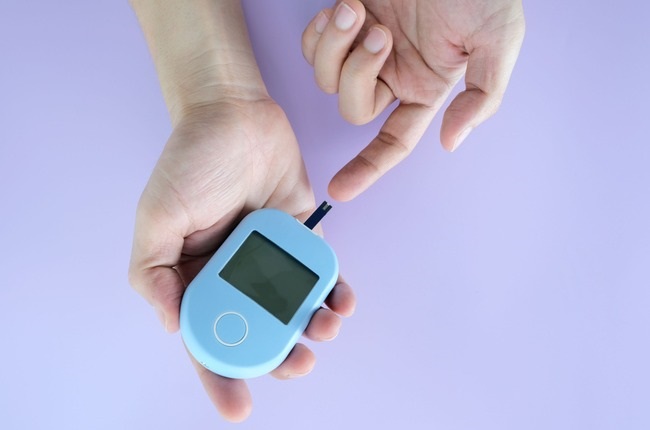
- One in nine South Africans live with diabetes.
- Many people living with the condition don't have access to the best, credible advice that can be life-changing.
- Here, three students from Stellenbosch University break down five myths and essential information about diabetes you need to know.
Do you or someone you know have diabetes? Do you think that you might be at risk for diabetes?
With one in nine South Africans living with diabetes (making us the country with the highest number of people living with diabetes in Africa) and over 537 million adults (aged 20-79 years) in 2021 found to be living with diabetes worldwide, it unfortunately seems likely. It is projected that by 2030, there will be an estimated 643 million people living with diabetes.
Alarmingly, many people living with diabetes still experience insufficient access to scientific advice because of conflicting opinions. In support of World Diabetes Day, observed this month on 14 November, and this year's theme, "Education to protect tomorrow", here is some information you or a loved one may find useful and even life-changing.
What is diabetes?
Diabetes is a metabolic condition that affects the way the body uses sugar. Normally, when carbohydrates are consumed, they get broken down into sugar which then travels in our blood to our cells. Insulin is a hormone that is released from the pancreas and functions as the key that moves sugar from carbs into our cells. When sugar enters the body cells, the body uses this as energy for daily activities. However, if you have diabetes, your body can't transfer the sugar into the cell without some help. If no help is received, it leads to sugar building up in the blood with nowhere to go and your cells becoming starved of nutrients needed to function.
READ MORE | Diabetes is one of SA’s biggest killers. Here’s how to manage it
Types of diabetes
Diabetes is diagnosed in three major categories:
- Type 1 diabetes is diagnosed when the pancreas no longer produces insulin.
- Type 2 diabetes is diagnosed when the body cells don't respond to insulin in the way they are supposed to due to decreased insulin sensitivity (so the cells are labelled insulin resistant) or when the pancreas doesn't produce enough insulin.
- Gestational diabetes sometimes occurs in pregnant women, usually during the second half of the pregnancy, when her cells may become temporarily insulin resistant, but it may go away after the baby is born.
Do you have diabetes? Share your story of life after diagnosis here.
Five myths about diabetes
Myth 1: Type 1 diabetes is more severe than type 2 diabetes
Type 1 and type 2 diabetes are equally as serious, and both can have severe consequences if not managed correctly.
Some of these include:
- Diabetic ketoacidosis (DKA) - a life-threatening condition that occurs when the body is hyperglycaemic (when there is too much sugar in the blood) for too long.
- Cardiovascular diseases like heart attacks, strokes and anginas.
- Nerve damage where the sugar damages the nerve walls causing pain and numbness that starts in the toes or fingers.
- Eye damage where the vessels are damaged and can lead to blindness.
- Wound healing complications (often in the feet) due to nerve damage leading to wounds that go unnoticed, getting bacterial infections, leading to amputations.
The longer you live with diabetes, the higher the risk of developing complications, but having good blood sugar control will help lower the risk of these complications.
Myth 2: I can cure my diabetes
Diabetes is a chronic condition and cannot be cured. It is a condition that requires medical check-ups and script renewals. With type 1 diabetes, the person will need to inject insulin for the rest of their life as the body does not produce its own. Careful dietary and lifestyle planning and support are necessary for optimal quality of life.
Type 2 diabetes is also a life-long condition, but it is often possible to manage it with lifestyle changes and oral medication, though in some cases, additional insulin treatment is necessary. Your doctor might prescribe insulin if you have type 2 diabetes and have been unable to control your blood sugar levels with current treatment.
READ MORE | I have been diagnosed with type 2 diabetes – can it be reversed?
Evidence suggests that type 2 diabetes can be put into remission, mainly through weight loss in individuals who are overweight, with remission being more successful if weight is lost soon after diagnosis. Type 2 diabetes is thought to be in remission when the HbA1c, which is a measure of long-term blood sugar levels, is below 6.5% for at least 6 months. However, it is still important to live a healthy lifestyle.
Myth 3: Drinking lots of water will help when I have a hyperglycaemic episode
Hyperglycaemia can be defined as an increased amount of sugar in the blood (hyper, meaning high, and glycemia refers to blood sugar levels). Blood sugar levels are classified as high, with values of >7mmol fasted and >11 mmol 2 hours after eating. Blood sugar levels will increase when carbohydrates are eaten. Carbohydrates are then broken down into sugar in the body.
Many people believe that when they have high blood sugar, drinking water will help to lower it. Though drinking water is a beneficial part of a healthy lifestyle, it cannot replace management techniques like taking medication and enjoying carbohydrate-balanced meals to reduce sugar spikes. Drinking water alone will not prevent a hyperglycaemic episode.
Myth 4: No one else in my family has diabetes, so I won't get diabetes
Having an immediate family member, such as a parent or sibling, with diabetes does increase your risk of developing diabetes. Genetics and a family history of both types of diabetes is a risk factor for developing the condition.
However, just because someone in your family doesn't have diabetes, it doesn't mean that you are protected from developing diabetes. Other chronic conditions such as hypertension (high blood pressure) and dyslipidemia (abnormal lipid levels) can increase the risk of developing type 2 diabetes. Other lifestyle factors also play an important role in the risk of developing type 2 diabetes, such as being inactive or overweight.
Myth 5: Now that I have diabetes, I can't eat certain foods and definitely need to cut out carbohydrates
The cornerstone of a healthy lifestyle is moderation. And it is the same with diabetes: all foods can be enjoyed in moderation, though the amount of carbohydrates consumed does need to be monitored more carefully. This is because the amount of carbohydrates consumed will influence the number of units of insulin that must be injected (if relevant) and vice versa.
READ MORE | Here’s a healthy meal for someone with diabetes
Even if you are not using insulin, it is important to focus on the quality and variety of the food you eat when managing diabetes. Healthy and balanced eating patterns include eating all food groups. This means a variety of fruit and vegetables, low-fat proteins and dairy, legumes, wholegrain products, vegetable oils, nuts and seeds. Carbohydrates form a very important part of our diet and play a vital role in providing fibre and are the main source of energy for our brains, and there is no need to cut this out when you have diabetes.
Nutritional and medical management are both important in maintaining or improving your quality of life when you are living with diabetes.
For individualised advice on how to live a healthier lifestyle and have better control of blood glucose levels, please consult a registered dietitian.
Estelle van Rijn, Nadia Visser and Bronwyn Grey are final year BSc Dietetics students at Stellenbosch University.
This resource is for educational purposes only and cannot replace individual assessment by a healthcare professional. ADSA is the Association for Dietetics in South Africa. Visit www.adsa.org.za to find more dietitians in your area. Visit the World Diabetes Day website for more tips and information about diabetes.




 Publications
Publications
 Partners
Partners











